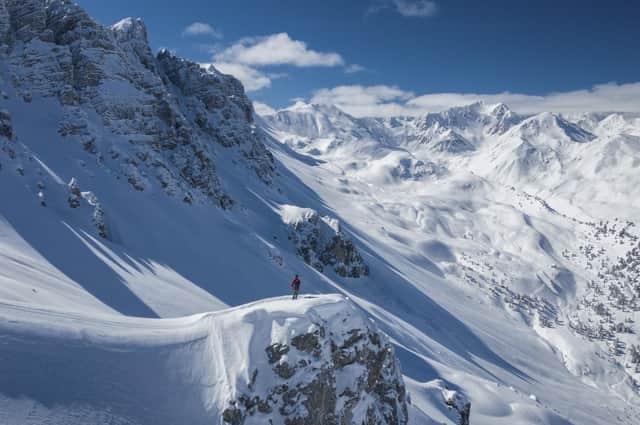Coming soon to a mountain near you: the next wave of climate activists


There was a very definite Scottish flavour, the other week, to an online panel discussion hosted by adventure sports brand Patagonia, entitled What is the Future for our Mountains?
Chaired by former Olympic snowboarder and contemporary backcountry charger Lesley McKenna, the speakers included Highlands-based snowboarder Lauren MacCallum, general manager of the environmental pressure group Protect Our Winters UK, and fellow Scot Adam Raja, POW UK’s marketing manager and also a keen climber and photographer. Rounding out the panel was Lena Stoffel, the German-born, Austrian-based professional freeskier and star of new Patagonia documentary, Vanishing Lines.
Advertisement
Hide AdAdvertisement
Hide AdMcKenna introduced the event as “a discussion... regarding not just protecting high alpine spaces, but how those spaces relate to our connection to the wilderness and what that means for us, in the outdoor adventure sports community, in terms of the climate emergency.” And if that sounds like a lot of ground to cover in a little over an hour, well, MacCallum, Raja and Stoffel did an admirable job of providing both food for thought and cause for cautious optimism within the allotted time.
Stoffel kicked things off with an overview of the concerns raised in Vanishing Lines – a film highlighting the damage which could be caused by a proposed development between the resorts of Pitztal and Ötztal in Austria. Top fact from Vanishing Lines: if you were to ski all the pistes in the Alps, you would cover approximately 25,000km – equivalent to travelling from Innsbruck to Hawaii and back again. Point being: there are already plenty of pistes out there, so is it really necessary two connect two already massive ski resorts in order to make more? Particularly when the proposed plan involves the levelling and removal of ice on 72 hectares of glacial terrain, as well as grinding down a mountain ridge by 40 metres, destroying multiple wildlife habitats in the process?
Stoffel, it probably goes without saying, takes the view that this is something the world could do without, and while she said she could understand the desire of ski resorts to compete with each other by opening up new terrain, she also questioned the validity of the market research on which they base their decisions.
Apparently surveys show that the Pitztal-Ötztal development would be popular with visiting skiers, but Stoffel counters: “I think those surveys are made at breakfast tables in hotels where the people don’t get any more information about what [the development] actually means. If you were to ask the same person at the mountaintop as they look out at a beautiful area, and tell them what it means for that area... I don’t think they would say they need a ski slope going down there.”
Key to countering such projects is building as wide a base of support as possible for any campaign, and POW’s Adam Raja opened up a whole world of possibilities in this respect, speaking about the importance of inclusion and diversity in the mountains. Growing up mixed race on the outskirts of Glasgow, he explained, “I wasn’t running around the mountains as a child, I was running around the housing schemes of Glasgow getting into all kinds of trouble.”
After falling in love with Glencoe, however, and subsequently with the sport of climbing, he became inspired to become an activist. “Before I had this connection,” he said, “the idea of protecting these places, protecting snow, never crossed my mind – and why would it, when you’ve spent your life surrounded by concrete?”
His story, he believes, could have important implications for the whole environmental movement: “Ultimately, by opening up the outdoors and welcoming others, we’re allowing new people to forge connections with nature, be part of the community – and not only is that the right thing to do, I think it will naturally and authentically add more voices to these conversations... and I think that’s going to be increasingly important going forward.”
There were reasons to be hopeful, too, from MacCallum. She pointed out that between 12 and 25 million people in the UK access the outdoors every week, so “the ability for us to come together and organise is huge.
Advertisement
Hide AdAdvertisement
Hide Ad“Politicians are fickle,” she went on, “and they will follow votes, but they need to be convinced of the diverse groundswell of public support. So when it’s not just traditional environmental campaigners turning up, but when mountain bikers, climbers, skiers, snowboarders, walkers start turning up and speaking to their MP... that diversity gives us more power, and the bigger the base, and the more diverse the base, the more influential we can be."To watch Vanishing Lines, visit https://eu.patagonia.com/gb/en/films/vanishing-lines/
For more on Protect Our Winters UK, see www.protectourwinters.uk
A message from the Editor:
Thank you for reading this article. We're more reliant on your support than ever as the shift in consumer habits brought about by coronavirus impacts our advertisers.
If you haven't already, please consider supporting our trusted, fact-checked journalism by taking out a digital subscription at https://www.scotsman.com/subscriptions
